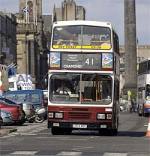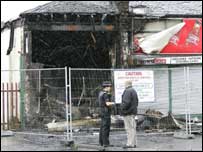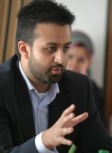After a 4 week trial and a 9 hour jury deliberation, Scotland has its first home grown Islamic terrorist plot and plotter.
But without the near impossible to defend charges under the amended Terrorism Act of 2000, it is unlikely that the prosecution would have been able to make a Breach of the Peace charge stick.
As the news of the Siddique verdict came in, the 24 hour news channels put the headline up on their news ticker; “guilty of Islamist terror offences” said both Sky and BBC News 24.
Real Radio news led with “Scotland has its first home grown Islamic terrorist”.
The day after the end of the case saw the Scottish press carry security service sourced stories that they believed Siddique had been intending to carry out a terrorist attack in Canada.
There was no evidence produced in court to back up this far more serious accusation.
Lawyer Aamer Anwar said Siddique was doing what millions of people did every day: “looking for answers on the internet”.
He added: “Atif Siddique states that he is not a terrorist and is innocent of the charges and it is not a crime to be a young Muslim angry at global injustice.”
And that’s the central point in this farce: Siddique was not a terrorist or even a terrorist plotter.
He was an angry young man, angry about the situation Muslims in Palestine and Iraq face.
It was anti-social of him to show people footage he had on his mobile phone and reasonable that he should face a charge of breach of the peace if those people gave evidence that it put them in a state of fear and distress.
But they didn’t give such evidence; they testified that although unpleasant, they didn’t feel threatened.
So without the ludicrous charges of possessing video footage which is to be found without trying very hard on the internet, it is unlikely that Siddique would have even been convicted of a breach of the peace.
But there’s a point that needs to be made here about the people of Glasgow’s previous relationship to and support for terrorism.
All through the Irish war, the “troubles” as they are known, every Friday and Saturday night teams of people would methodically move through the bars and clubs of Glasgow frequented by both Catholics and Protestants and collect money for organisations who were actively involved in acts of violence.
In an era before the internet, predominantly young men would obsessively collect information on the activities of both Protestant and Republican armed groups.
This was something that went on pretty much unhindered by the state and yet in 21st century Scotland to have video footage on a computer of insurgents in Iraq is to be guilty of supporting terrorism.
This verdict will do more to push young, disaffected Muslims into the arms of extremist groups than any number of Jihadist DVDs on sale on the internet.
While right wing extremist groups openly use the internet to threaten groups and individuals with violence, publishing home addresses for example, the police and security services are using the draconian powers available to them to target angry young Muslims with footage from Iraq on their computers.
What we don’t get to hear about are the many family, friends and relatives of such people who are also being arrested and held without charge for days on end under the Terrorism Act, people for whom their only crime is to be a Muslim.

 Edinburgh’s bus drivers have been told they will not have to ask Muslim women to remove their veils after all.
Edinburgh’s bus drivers have been told they will not have to ask Muslim women to remove their veils after all. Racist incidents across Scotland have soared following the terrorist attack on Glasgow Airport. New figures reveal a surge in cases of violent attacks, abuse and harassment in the four weeks after the car bombing, with the worst cases including attempts to blow up an Asian shop and a mosque.
Racist incidents across Scotland have soared following the terrorist attack on Glasgow Airport. New figures reveal a surge in cases of violent attacks, abuse and harassment in the four weeks after the car bombing, with the worst cases including attempts to blow up an Asian shop and a mosque. “At the Scotland United Against Terror rally I was heckled by someone in the crowd.
“At the Scotland United Against Terror rally I was heckled by someone in the crowd.